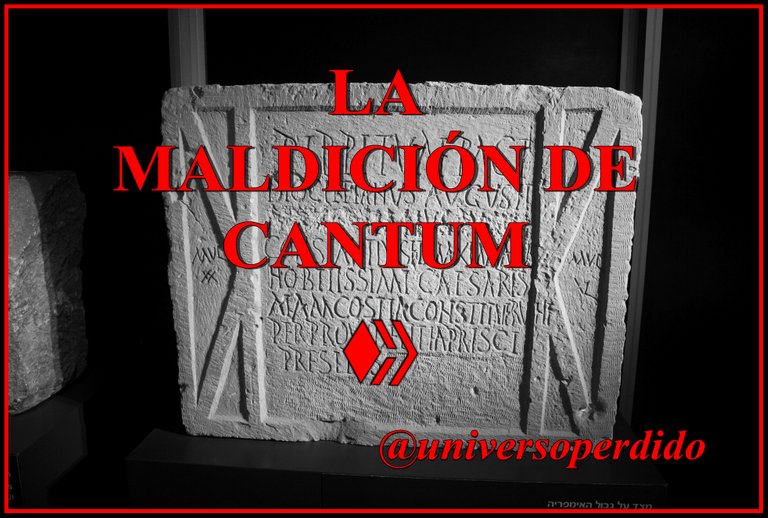[ESP-ENG] LA MALDICIÓN DE CANTUM I (Short Story)

Original image | Edited with PhotoScape
«Es maravilloso estar vivo, aunque siempre duela.»
«It is wonderful to be alive, even if it always hurts.»
—Boris Pasternak

ESPAÑOL
LA MALDICIÓN DE CANTUM I
Mucho o poco se hablaba de las civilizaciones que emergieron de la región perdida de Isahara, a excepción de una, que fue la que llamó la atención de sabios conocedores de manuscritos antiguos. Se dice que aquel lugar era hogar de titanes, que gobernaron con puño de hierro desde allí a todos los demás pueblos que se instalaron en los valles y praderas de Isahara.
La ciudad de Cantum, surgió de los cimientos ruinosos del pueblo de Ishta: «La madre bruja», y estos fueron derrotados por pueblos nómadas que decidieron asentarse junto aquel pueblo de seres particulares. Los hijos de Ishta eran detestables en apariencia, por su piel escamosa y gris parecida a un reptil, con ojos achinados, amarillos y sin parpados, y tenían la tapa craneal completamente plana y sus cabezas estaban ausentes de orejas.
Cualquiera que los viera actualmente sentiría mucho temor, puesto que su lenguaje solo emitía gruñidos y sonidos carrasposos que parecían provenir de lo más inhóspito de sus gargantas. Cuenta la leyenda que la bruja Ishta, al no tener hijos los creó, pero aberrantes en apariencia. Mezcló la sangre de reptiles con la de humanos y de ese pozo caldoso nacieron esos humanoides.
Los habitantes de Cantum los detestaban y temían, especialmente por sus rituales que iban dirigidos a los dioses reptantes, que según sus creencias moraban en la tierra y el cielo. Y en medio de una riña de discusiones decidieron atacarlos y destruirlos. Los guerreros de Cantum acabaron con ellos raudamente, puesto que los hijos de Ishta no conocían el arte de la guerra. Quemaron su poblado y lanzaron los cadáveres a las lagunas, que proliferaban en la región perdida de Isahara.
La ciudad de Cantum prosperó a través del tiempo con fuego y metal, se dice que gracias a la dirección de los hijos de los titanes reyes. Dentro de sus muros se encontraba el corazón de Carnak, la gema más apreciada por todos los pueblos de Isahara y más allá. Se dice que es el órgano vital cristalizado del rey de los titanes, solidificado después de arráncaselo y entregárselo a sus hijos.
El corazón de Carnak yacía dentro de un templo protegido por sacerdotes eunucos, pálidos y severos. El aspecto de estos sabios era parecido al de un fantasma o un ser espectral, puesto que evitaban la luz del sol y el contacto con cualquier otro ser vivo. El rey de Cantum, señor de todo lo que habita en Isahara, gobernaba con la misma inclemencia con la que regían sus padres divinos. El primer descendiente era «Carsint», y lo apodaban el cruel, porque desde su trono esclavizaba a todos los demás pueblos que se establecían en las cercanías de su amada ciudad.
Durante aquellos días posteriores a la erradicación de los hijos de Ishta, las personas temían por alguna maldición vengativa de parte de la bruja. Las supersticiones corrían por las calles de Cantum, incluso atravesaban las puertas de los herméticos templos. Los oídos de los «Tanari» (los sacerdotes ciegos), eran tan agudos que podían percibir hasta el más insignificante y perturbador sonido.
En la parte más recóndita del lugar sagrado, un grito agudo emergió de la profunda oscuridad. Los invidentes en su diestra movilidad para deslizarse entre las sombras dieron con su origen, y los demás sacerdotes, que no poseían aquel semblante despojado de visión, acudieron a ellos para encontrar la causa de la agitación.
Habían encontrado a «Nahain», el más viejo y sabio de todos los sacerdotes invidentes, que había escrito con sangre sobre La Pared Sagrada de los Lamentos antes de emitir su último grito de vida. El escrito escarlata estaba en idioma Niunsu, una de las primeras lenguas de Isahara, y al traducirlo los sacerdotes videntes se espantaron, porque solo decía la palabra: «Venganza».
FIN
ENGLISH
THE CURSE OF CANTUM I
Much or little was said about the civilizations that emerged from the lost region of Isahara, with the exception of one, which was the one that attracted the attention of wise men who knew about ancient manuscripts. It is said that that place was home to titans, who ruled with an iron fist from there to all other peoples who settled in the valleys and prairies of Isahara.
The city of Cantum emerged from the ruined foundations of the town of Ishta: "The Witch Mother", and these were defeated by nomadic peoples that decided to settle along with that town of particular beings. The sons of Ishta were detestable in appearance, because of their scaly and gray skin, similar to a reptile, with flattened, yellow eyes and without eyelids, and their cranial cover was completely flat and their heads were absent of ears.
Anyone who saw them today would be very frightened, for their language only emitted grunts and throaty sounds that seemed to come from the most inhospitable part of their throats. Legend has it that the witch Ishta, not having children, created them, but aberrant in appearance. She mixed the blood of reptiles with that of humans, and from that brothy well those humanoids were born.
Inhabitants of Cantum hated and feared them, especially because of their rituals addressed to crawling gods that, according to their beliefs, inhabited earth and heaven. And amidst a quarrel of discussions they decided to attack and destroy them. The warriors of Cantum quickly destroyed them, since the sons of Ishta did not know the art of war. They burned their village and threw the corpses into the lakes, which proliferated in the lost region of Isahara.
The city of Cantum prospered through time with fire and metal, it is said that thanks to the direction of the sons of the titan kings. Within its walls was the heart of Carnak, the most prized gem of all the peoples of Isahara and beyond. It is said that it is the crystallized vital organ of the king of the titans, solidified after being ripped out and given to his children.
The heart of Carnak lay in a temple protected by eunuch priests, pale and severe. These sages looked like a ghost or a spectral being, since they avoided sunlight and contact with any other living being. The king of Cantum, lord of all that lives in Isahara, ruled with the same inclemency of his divine parents. The first descendant was "Carsint", and they called him the cruel one, because from his throne he enslaved all other peoples that settled near his beloved city.
During those days after the eradication of Ishta's sons, people feared for some revenge curse from the witch. Superstitions ran through the streets of Cantum, even through the gates of the hermetic temples. The ears of the "Tanari" (blind priests) were so acute that they could perceive even the most insignificant and disturbing sound.
In the innermost part of the sacred place, a sharp cry emerged from the deep darkness. The blind in their right-handed mobility to slide through the shadows found their origin, and the other priests, who did not possess that countenance deprived of vision, came to them to find the cause of the agitation.
They had found "Nahain", the oldest and wisest of all blind priests, who had written in blood on the Sacred Wall of Wails before emitting his last cry of life. The scarlet writing was in Niunsu language, one of the first languages of Isahara, and when the seers translated it, they were frightened because it only said the word: "Revenge".
THE END
Escrito por @universoperdido. 07 de Enero del 2021
Written by @universoperdido. January 07, 2021

Relatos anteriores | Previous stories
| [ESP-ENG] EL OLVIDO |  |
|---|---|
| [ESP-ENG] COBARDÍA |  |
| [ESP-ENG] LA PRISIONERA DE BELIAM |  |

¿Eres escritor? ¿No encuentras un lugar adecuado para colocar tus trabajos literarios? Unete a Literatos, una comunidad en Hive donde puedes publicar tus cuentos, poemas, ensayos literarios y novelas inéditos de tu propia autoría.

Interesante relato tu descripción me hizo usar la imaginación, muchas gracias.
Gracias amiga, que bueno que te gustó. ¡Saludos!
https://twitter.com/relatos118/status/1347409857717145600